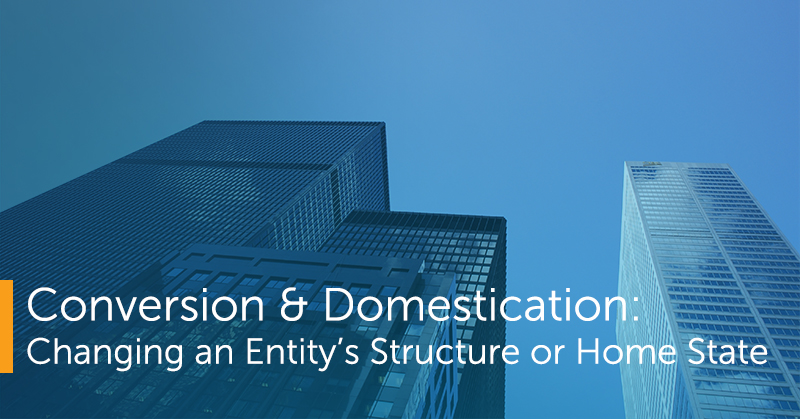-
Software
Compliance Software
Oversee licenses, track renewals, access documents, and more from a single interface.
Software Overview -
Services
Compliance Services
Full service compliance solutions for organizations throughout their entire lifecycles.
Services Overview -
Industries
-
Partner
- Information Center
Conversion & Domestication: Changing an Entity’s Structure or Home State

As organizations grow, what worked in the past doesn’t always fit with present needs or future plans. Maybe it’s a name that no longer adequately describes what they do, or revenue has grown to the point where a new structure would provide tax benefits. Maybe operations have shifted, and a change of jurisdiction would make sense. One way to change state of domicile or corporate structure is to dissolve existing entities and form new ones. Yet most states provide entity conversion and domestication options that can maintain your organization’s existence and streamline certain aspects of the transition. When contemplating changes to a business entity, it pays to fully explore your options.
Domestication: move an entity to a new state
When your home state of incorporation is no longer the most advantageous for tax purposes or other business reasons, some states allow you to file a statement of domestication that announces your intention to move your corporate home to another state. Then new formation documents are filed in the new state. Once the new entity is formed, the entity in the original state of domicile must be dissolved.
Where available, domestication generally includes these basic requirements, among others:
- The home state and new state both allow domestication
- The entity qualifies to form and operate under the laws of the new jurisdiction
- The change is permitted by the organization’s own “organic” rules
- The change is authorized by appropriate corporate officers or owners
- The entity is current with annual reports, tax payments, and other obligations and in good standing in the original state of domicile
In addition to fees for formation and dissolution, the organization must pay a domestication fee. A registered agent must be appointed in the new jurisdiction (here’s why you’ll want a professional registered agent). In addition, revenue departments and other authorities must be notified of the change in domicile.
In many cases, the entity can apply for authority to continue operations in the home state as an out-of-state or “foreign” entity once the company relocates, ensuring continuous operations in that state.
Conversion: change the legal structure of an entity
Many states also allow businesses to change structures, for example, from a partnership to an LLC, or from an LLC to a corporation, through a process called conversion. This generally involves submitting a plan of conversion to the secretary of state or other authority, providing evidence that the plan is authorized by appropriate parties, and providing additional information required by the state. Each state authorizes a unique set of corporate structures, so one of the primary considerations is whether the desired structure is available to you. In addition, conversions generally include these requirements:
- The entity is current on taxes and annual reports and in good standing
- The organization’s rules of operation permit the change
- The conversion is permitted by state law
- The entity qualifies to operate under the new structure under applicable state laws
- The change is approved by appropriate owners, officers, and in some cases other interest holders
When changing structures, the organization will need to apply for a new federal Employer Identification Number (EIN) from the IRS.
Effects of domestication and conversion
As Iowa’s statute states, “An organization that has been converted . . . is for all purposes the same entity that existed before the conversion.” This means that the entity operates without interruption through the transition and retains its original date of formation.
When contemplating changes in domicile or structure, it’s important to seek advice from qualified legal and accounting professionals. We can make the change seamless for you by completing all of the required paperwork and expediting your filings.
Business licenses
One thing that does not follow the legal entity through these changes is business licenses. In most cases, changing state of domicile or entity structure requires obtaining new professional licenses and business licenses. Company licenses in regulated professions and trades warrant particular scrutiny before making any entity changes, because state licensing boards impose specific entity requirements on those businesses, touching on everything from ownership and management to names and structure. Businesses in highly regulated industries such as architecture, engineering, construction, and pharmaceuticals should proceed with care.
Complex, but worth a look
While these processes often add a layer of complexity to an already complex set of state filings, the continuity they afford in your business entity may streamline other aspects of the change. Conversion and domestication are not universally available, and the requirements are varied and highly complex. For that reason, it’s best to seek advice from your legal and accounting teams early in the research process. If you’ve decided it’s time for your organization to move forward with domestication or conversion, we can knock the paperwork out for you so you can move on with your plans. Just get in touch or give us a call, 1-888-995-5895, and we’ll be glad to help.






